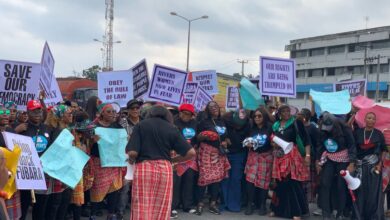Nigerian govt announces 10-year entry ban for visa overstay

The Federal Government has introduced tougher immigration penalties, stating that expatriates who remain in the country more than six months past their visa expiry will face a five-year entry ban, while those who overstay by a year will be barred for 10 years.
In addition, a daily fine of $15 will be imposed on overstayers, starting from the visa’s designated exit date, with the new rule taking effect on August 1.

Interior Minister Olubunmi Tunji-Ojo made this announcement on Friday during a meeting with the Organized Private Sector and other stakeholders at the Nigeria Employers’ Consultative Association House in Ikeja, Lagos.
The announcement came as he launched the Ministry of Interior’s new Expatriate Administration System.
Starting May 1, the government will implement several reforms, including automated Landing and Exit Cards, an Electronic Visa system, Expatriate Comprehensive Insurance, and an enhanced Combined Expatriate Resident Permit and Alien Card.
READ MORE: Bring Back Fubara — women protest against emergency rule in Rivers
Additional measures include the introduction of a Temporary Resident Visa, a Temporary Work Permit, and an updated Expatriate Quota system.
According to Tunji-Ojo, these initiatives are designed to reduce visa overstays and ensure accurate tracking of expatriates residing in Nigeria.
“Our records indicate fewer than 50,000 expatriates in Nigeria, which we know is inaccurate. We need to establish the true number of foreigners living in the country. A nation without reliable data cannot progress, as data is the foundation of effective planning,” he said.
Under the new system, he explained that Landing and Exit Cards will be automated. He emphasized that expatriates must leave the country on or before their visa expiration date and may only apply for extensions from outside Nigeria.
“This is serious. We’re not introducing anything new regarding the landing and exit card, just automating the current paper-based process. In a country of over 230 million intelligent, tech-savvy people, we shouldn’t be using paper cards. Going forward, you must complete your landing and exit cards online,” he said.
He noted that the automated system would enhance the ability to monitor individuals who overstay their visas.
“If you overstay, there will be consequences. Overstaying by six months attracts a five-year ban; one year attracts a 10-year ban. There is also a $15 daily overstay penalty. People claim to be visiting Nigeria for two weeks but stay for 30 years working — that must end,” he said.
THE RULE COMES INTO EFFECT FROM MAY 1
Although the new measures will come into effect on May 1, a three-month grace period will be granted for expatriates to regularize their status before strict enforcement begins in August.
Despite the shift to automated visa processes, physical interviews will still be mandatory for standard visa applications.
- FOLLOW US ON INSTAGRAM: Get the most important news on your social media feed
- FOLLOW US ON FACEBOOK: Get the most important news on your social media feed
- FOLLOW US ON X: Get the most important news on your social media feed
The Minister stated that the new Electronic Visa system, also launching on May 1, will enable applicants to secure visas within 48 hours.
This new system replaces the current visa-on-arrival policy, which he criticized as being susceptible to corruption and undue influence.
“We’re introducing the e-visa to make access to Nigeria easier for tourists and business travellers. Globally, population equals market, and we want to open our borders to legitimate opportunities. The e-visa eliminates bottlenecks. No more lobbying. It’s a seamless and secure system,” Tunji-Ojo stated.
He also announced the launch of a mandatory annual Expatriate Comprehensive Insurance policy, explaining that it was essential as the ministry frequently exceeds its budget for repatriating Nigerian citizens.
“We spend billions annually on repatriation. Just a month ago, we had exhausted our yearly budget and had to request an extra N25m. That money should be used to build infrastructure, not deport individuals. We needed a sustainable solution,” he said.
He explained that the government has chosen to implement a mandatory insurance policy rather than requiring a lump-sum repatriation deposit—which could exceed $10,000.
Through this arrangement, the insurance provider will bear the cost of repatriating defaulters, thereby reducing the financial burden on the government.
“All over the world, there’s personal liability insurance. Your stay here should benefit both you and the host country — not leave Nigeria worse off. The Expatriate Comprehensive Insurance is now mandatory and will be paid annually along with the CERPAC,” he said.
He also announced that the CERPAC process will be fully automated without any increase in fees. “The system will be integrated with Interpol to improve the tracking of criminals and individuals with suspicious motives,” Tunji-Ojo stated.
Additionally, he stressed that employers will now be held responsible for any immigration violations committed by their expatriate staff.
The electronic version of CERPAC is set to roll out on May 1.
READ MORE: DIASPORA LENS




